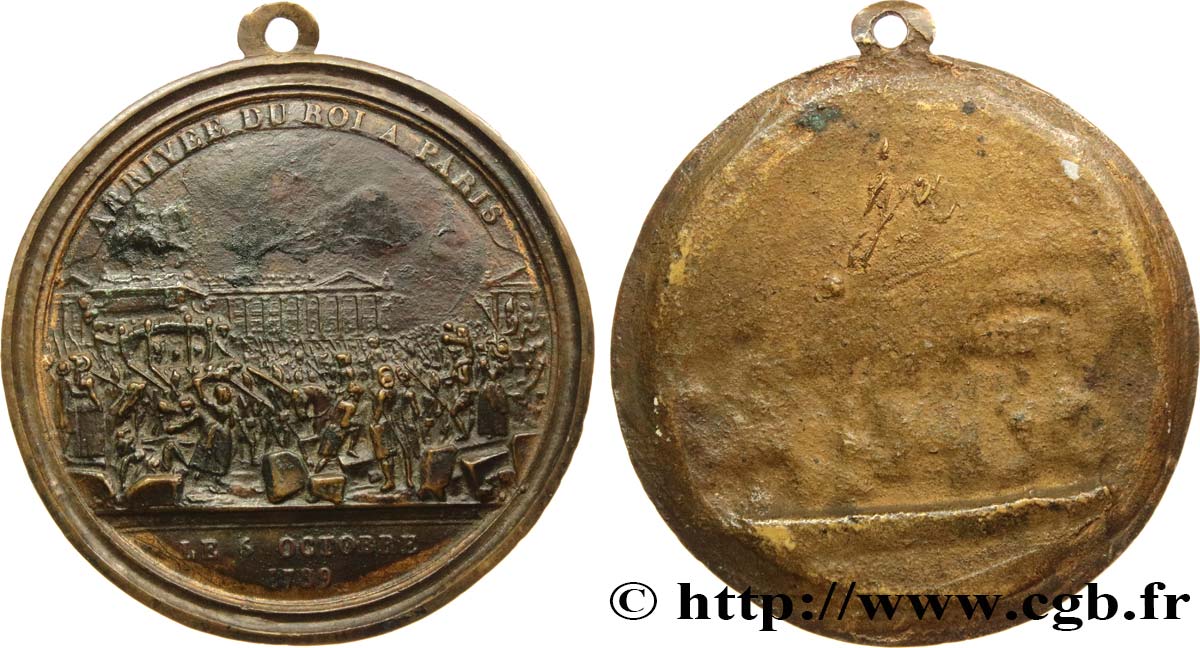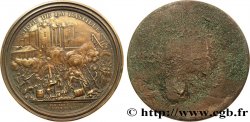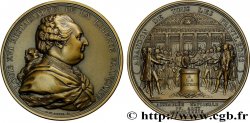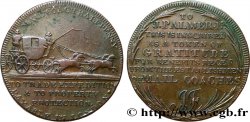fme_614391 - LOUIS XVI Médaille uniface, Arrivée du Roi à Paris
160.00 €(Approx. 188.80$ | 139.20£)
Quantity
Add to your cart

Type : Médaille uniface, Arrivée du Roi à Paris
Date: 1789
Mint name / Town : 75 - Paris
Metal : copper-bronze
Diameter : 91 mm
Orientation dies : 12 h.
Engraver ANDRIEU Jean-Bertrand (1761-1822)
Weight : 50,89 g.
Edge : lisse
Puncheon : sans poinçon
Coments on the condition:
Patine sombre hétérogène avec quelques marques d’usure sur les hauts reliefs. Présence de taches noires. Rayures à l’exergue
Catalogue references :
Obverse
Obverse legend : ARRIVEE DU ROI A PARIS EN LÉGENDE CIRCULAIRE ; À L’EXERGUE EN DEUX LIGNES : LE 6 OCTOBRE / 1789.
Obverse description : Louis XVI, en voiture avec sa famille, et entouré du peuple qui le conduit de Versailles à Paris, passant sur la place Louis XV, signé : ANDRIEU. F. et N°.2.
Reverse
Reverse description : Lisse.
Commentary
Diamètre sans bélière : 82,5 mm
Bertrand Andrieu (1761-1822) est né à Bordeaux. À l’âge de 25 ans, il quitte sa ville natale pour Paris où il devient élève de Gatteaux. En 1789, il grave la médaille de la prise de la Bastille. Il est l’auteur des bustes de Napoléon et de Louis XVIII qui sont trouvés si beaux qu’ils servent pour le droit de nombreuses médailles et jetons, associés aux revers d’autres graveurs. Il reste l’un des grands graveurs du Premier Empire.
Ce type avec cette scène mémorable sera largement repris, copié et imité tout au long du XIXe siècle.
Diameter without bail: 82.5 mm Bertrand Andrieu (1761-1822) was born in Bordeaux. At the age of 25, he left his hometown for Paris where he became a student of Gatteaux. In 1789, he engraved the medal of the storming of the Bastille. He is the author of the busts of Napoleon and Louis XVIII which were found so beautiful that they were used for the right of numerous medals and tokens, associated with the reverses of other engravers. He remains one of the great engravers of the First Empire. This type with this memorable scene will be widely taken up, copied and imitated throughout the 19th century
Bertrand Andrieu (1761-1822) est né à Bordeaux. À l’âge de 25 ans, il quitte sa ville natale pour Paris où il devient élève de Gatteaux. En 1789, il grave la médaille de la prise de la Bastille. Il est l’auteur des bustes de Napoléon et de Louis XVIII qui sont trouvés si beaux qu’ils servent pour le droit de nombreuses médailles et jetons, associés aux revers d’autres graveurs. Il reste l’un des grands graveurs du Premier Empire.
Ce type avec cette scène mémorable sera largement repris, copié et imité tout au long du XIXe siècle.
Diameter without bail: 82.5 mm Bertrand Andrieu (1761-1822) was born in Bordeaux. At the age of 25, he left his hometown for Paris where he became a student of Gatteaux. In 1789, he engraved the medal of the storming of the Bastille. He is the author of the busts of Napoleon and Louis XVIII which were found so beautiful that they were used for the right of numerous medals and tokens, associated with the reverses of other engravers. He remains one of the great engravers of the First Empire. This type with this memorable scene will be widely taken up, copied and imitated throughout the 19th century








 Report a mistake
Report a mistake Print the page
Print the page Share my selection
Share my selection Ask a question
Ask a question Consign / sell
Consign / sell
 Full data
Full data










